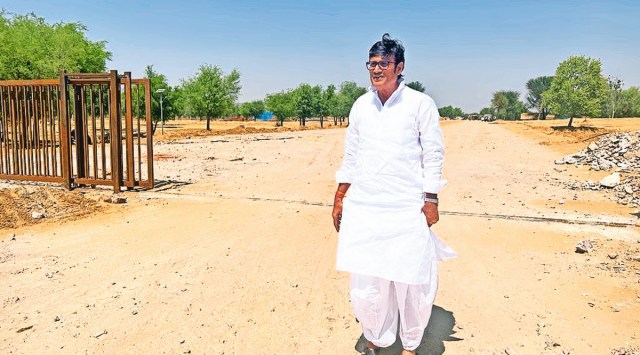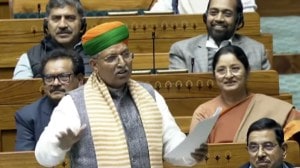Rajasthan Assembly finds university named in Bill is only on paper
The Gurukul University Sikar Bill, 2022, which seeks to incorporate the Gurukul Shikshan Sansthan, Sikar, as a university, was tabled on February 24. On Tuesday, Rajendra Singh Yadav, Minister in charge of Higher Education, was scheduled to move a motion to pass the Bill.
 Deputy Leader of Opp Rajendra Rathore at the site. (Express)
Deputy Leader of Opp Rajendra Rathore at the site. (Express)From over 80 acres of land to 155 academic blocks with 62 lecture halls and 38 laboratories. These were some of the key features of the private Gurukul University in Sikar, according to a Bill brought by the Rajasthan government and listed for debate in the Assembly.
🗞️ Subscribe Now: Get Express Premium to access the best Election reporting and analysis 🗞️
But the House found on Tuesday that the “state of the art” university existed only on paper — leaving the Congress government red-faced and prompting Speaker C P Joshi to seek a mechanism to avoid a repeat.
The Gurukul University Sikar Bill, 2022, which seeks to incorporate the Gurukul Shikshan Sansthan, Sikar, as a university, was tabled on February 24. On Tuesday, Rajendra Singh Yadav, Minister in charge of Higher Education, was scheduled to move a motion to pass the Bill.
As per the Bill, the university has 80.31 acres of land, with 28 administrative blocks, including offices of chairperson, president, pro-president, registrar, deputy registrar, assistant registrars, proctor, deans, etc., over 2,053.21 sq m.
The Bill claimed that the university has 155 academic blocks with 62 lecture halls and 38 laboratories, apart from tutorial rooms, computer labs, drawing halls, workshop, seminar halls, five common rooms each for boys and girls, three libraries, three reading rooms, ten professors’ cabins, a language lab, etc., spread across 17,947.93 sq m.
It claimed the library has about 50,000 books, apart from subscriptions to 36 newspapers and magazines, 56 physical journals and 23 e-journals — and that there was a teachers’/ officers’ residence on 740.05 sq m, a residential unit each for boys and girls, and a mess and cafeteria.
According to the Bill, the total area covered by the residential blocks was 40,70.27 sq m, and all three blocks together had a built-up area of 24,811.46 sq m.
Other facilities, the Bill claimed, included health care, power back-up, projectors in classrooms, fire safety provisions and a firing range as well as facilities for table tennis, chess, carrom, kabaddi, athletics, yoga, meditation and football — and a gymnasium, among other things.
In the Statement of Objects and Reasons of the Bill, the state government said: “With a view to keep pace with the rapid development in all spheres of knowledge in the world and the country, it is essential to create world level modern research and study facilities in the State to provide state of the art educational facilities to the youth at their door steps so that they can make out of them human resources compatible to liberalized economic and social order of the world.”
However, Deputy Leader of Opposition Rajendra Rathore had found out that the university did not exist.
Rathore’s Assembly seat is Churu in the Shekhawati region, like Sikar where the university supposedly existed. While travelling between Churu and Jaipur, Rathore has to pass Sikar and take the road where the university was supposed to exist.
According to Rathore, he visits his constituency “every Saturday” since the Assembly session is on in Jaipur. The BJP leader said that he thought “probably my eyes have betrayed me since I kept looking for the infrastructure mentioned in the Bill.” He called the local patwari (revenue official) to take him to the location where the university was supposed to exist.
At the land revenue numbers listed in the Bill, Rathore found empty land — there was a rusty sliding gate next to a small, partially constructed room without a roof. As evidence, he clicked photos.
On Tuesday, Rathore and Leader of Opposition Gulab Chand Kataria reached the Speaker’s chambers and informed him about their “sting”. “It is the duty of the Opposition. When the Bill was listed in the LoB (List of Business), they came and said you have listed this in business, and in this Bill, these are the things that they have brought,” Joshi told The Indian Express.
Subsequently, Joshi directed the Sikar District Collector to visit the spot. Once the official confirmed Rathore’s claims, the government was informed and the House moved to withdraw the Bill.
Rathore and Kataria, meanwhile, alleged that a massive scam was almost pulled off in the highest legislative body of the state. Demanding an FIR on the issue, Rathore alleged that since the Bill made it this far, crores of rupees must have exchanged hands.
Kataria said he has “not witnessed such a thing in his 40 years” at the Assembly. He said there is a long process before a Bill makes it to the House and asked whether the officials involved “were high on bhang” since “everyone simply gave the go-ahead without verifying the claims”.
The Opposition also targeted Amarika Singh, Vice Chancellor of the Mohan Lal Sukhadia University in Udaipur and most senior in the four-member committee that had purportedly verified the claims, especially on infrastructure, before they were listed in the Bill. Amarika Singh could not be reached for comment.
The Bill said the university is run by Gurukul Shikshan Sansthan, Sikar, which was registered under the Rajasthan Public Trusts Act, 1959, on July 18, 2017 — and “is engaged in the field of education and running educational institutions for the last several years”.
Rathore cited the Rajasthan Private Universities Act, which says that the project report submitted to the government should have information regarding financial resources of the sponsoring body along with audited accounts for the past five years. He said that since it’s not been five years since registration in this case, how could the audited accounts have been submitted?
While withdrawing the Bill, Education Minister Rajendra Yadav did not speak about the false information submitted to him.







